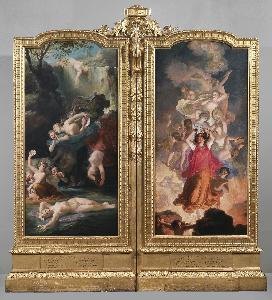Eugenio Agneni
Agnèni;Eugenio Agneni;Agneni
Place: Sutri
Born: 1816
Death: 1879
Biography:
Eugenio Agneni, also known as Agnèni, was a renowned Italian painter, primarily focusing on historic canvases. Born in Sutri, Italy, on January 26, 1816, and passing away in Frascati, Italy, on May 25, 1879, Agneni's artistic journey is a testament to his dedication to the craft.
Early Life and Training
Agneni began his artistic training in Rome in 1833, working under the guidance of painters Erzoche and Beretta of Bergamo. He later studied with Francesco Coghetti, further refining his skills. This foundation in traditional painting techniques would serve as the basis for his future success.
Notable Works and Contributions
In 1847, Agneni contributed to the decoration of the throne room in the Palazzo Quirinale with frescoes, showcasing his ability to work on large-scale projects. He also painted frescoes in the Villa Torlonia in Porta Pia and the chapel of San Vicenzo di Paola in Montecitorio. These works demonstrate his proficiency in capturing historic and mythological themes. Some of Agneni's notable works include:
- Departed Spirits of Great Florentines Protest Foreign Invasions, once displayed at the Museo Civico of Turin;
- Frescoes in the Palazzo Rocca in Genoa;
- Mythologic themes on the ceiling of the Queen's loggia in the Royal Opera House at Covent Garden and Buckingham Palace.
Artistic Style and Influences
Agneni's style is characterized by his use of **color** and **light**, which was influenced by the Venetian Painting Art Movement. This movement, known for its emphasis on color over line, had a significant impact on Western painting. Agneni's work can be seen as a continuation of this tradition, with his own unique interpretation.
Legacy and Later Life
Agneni's involvement in the insurgency that led to the brief Roman Republic in 1849 forced him into exile, during which he traveled to Savona, Genoa, Florence, Paris, and London. He returned to Italy in 1859 and 1866, joining the Garibaldini in their quest for Italian independence and unity. Upon his return to Rome, Agneni was appointed by Pope Pius IX as Captain of the Civil Guards. For more information on Eugenio Agneni's life and works, visit The Museum Villa Aldobrandini (Frascati, Italy) or Eugenio Agneni's Wikipedia page. His paintings can also be found on Eugenio Agneni's Wikioo.org page, showcasing his **historic canvases** and **frescoes**.

